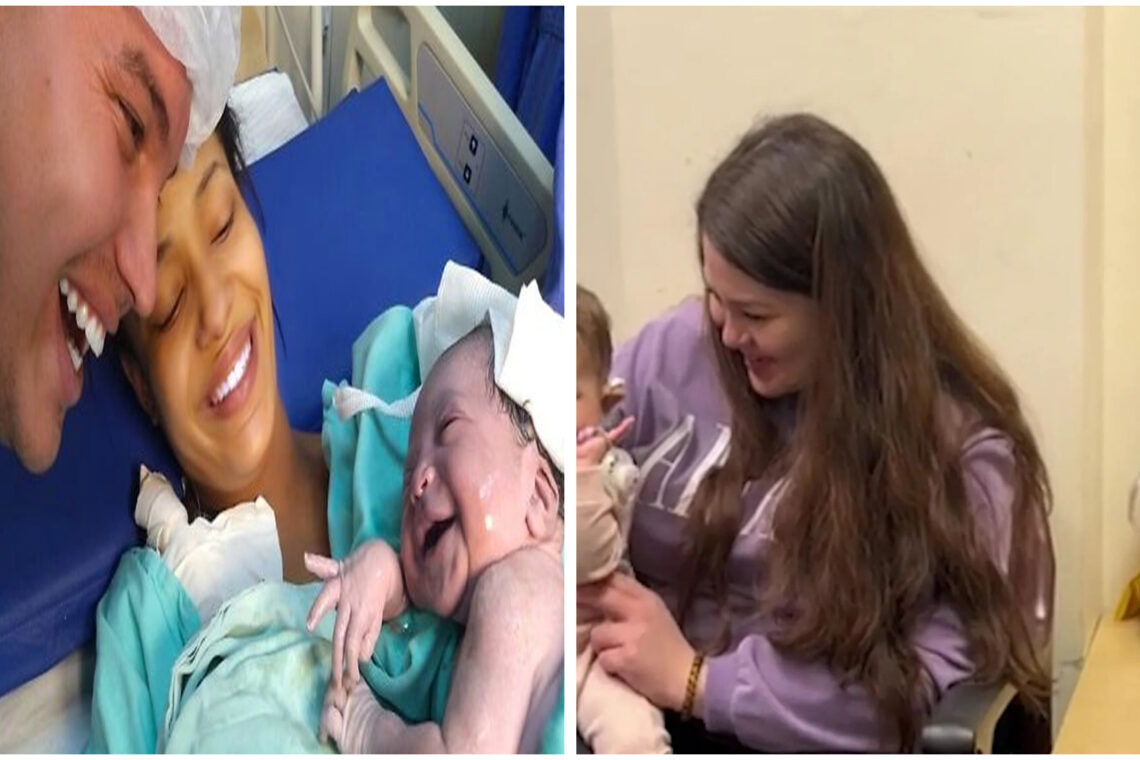
From a surprisingly early stage in their development, babies begin to perceive sounds while still in the womb, with the ability to hear discernible noises as early as 16 weeks. This fascinating ability often leads parents to engage with their unborn children through singing, talking, or playing music, all in the hope of creating a soothing environment for their little ones. When these babies enter the world, familiar sounds can evoke recognition and comfort, reinforcing the bond between parent and child.
A heartwarming story from Brazil beautifully illustrates this connection between an unborn baby and her father’s voice. Flavio Dantas and his partner, Tarsila Rosa, eagerly awaited the arrival of their daughter, Antonella. Living in Rio de Janeiro, Flavio made it a daily routine to talk to his unborn baby, fostering a sense of familiarity before her birth. Each morning, as he prepared to leave for work, he would spend a few moments speaking to Antonella, sharing his thoughts and feelings with her. Tarsila observed that each time Flavio’s voice filled the air, Antonella would respond by moving around, indicating her recognition of her father’s voice.
On August 11, which also coincided with Father’s Day in Brazil, their joyous anticipation culminated in the birth of their daughter. The moment Antonella emerged into the world marked not only a significant personal milestone for Flavio and Tarsila but also a remarkable instance of early communication between a father and his child. As Flavio spoke to Antonella for the first time outside the womb, a magical transformation took place. Her facial expression shifted from curiosity to pure joy; she lit up at the sound of her father’s voice, an instant connection forming that left her dad overwhelmed with emotion.
Flavio’s reaction was a blend of awe and love, tears streaming down his face as he witnessed this profound moment. Tarsila captured the essence of their experience in a heartfelt message, sharing how all the labor and pain associated with childbirth melted away in the face of their daughter’s beaming smile. The couple’s emotional journey resonated with many, as Tarsila aptly noted the beauty of witnessing their “princess” come into the world on such a significant day. The photo they shared, capturing that unforgettable first interaction between father and daughter, quickly gained attention, spreading across various media platforms and eliciting warmth and admiration from viewers around the globe.
This story is not just a testament to the emotional depth of parenthood but also highlights the scientific reality of how babies respond to familiar sounds in the womb. Numerous studies have indicated that prenatal exposure to sound can influence a child’s development. The auditory system of a fetus begins to develop early in pregnancy, allowing the baby to hear external sounds and even recognize the voices of their parents. This early exposure creates a profound impact, helping newborns feel more at ease in their new environment.
Research has shown that familiar songs or voices can have a calming effect on infants, potentially making transitions from the womb to the outside world smoother. For parents, this knowledge often leads to a variety of bonding activities during pregnancy. Many expectant parents take the opportunity to read aloud, sing lullabies, or play music, creating an intimate connection with their unborn child. This bonding experience can be a cherished ritual, not only fostering a sense of security for the baby but also nurturing the emotional well-being of the parents.
As stories like that of Flavio and Tarsila unfold, they serve as reminders of the extraordinary bond that forms between parents and their children even before birth. The early communication established through sound can lay the foundation for a lifetime of connection. It is moments like these that encapsulate the joy, wonder, and emotional depth of family life.
Moreover, the impact of such early interactions extends beyond the immediate joy of recognizing a parent’s voice. The emotional responses observed in newborns may also indicate the potential for developing social and emotional skills later in life. Research continues to explore how these initial experiences shape an individual’s ability to form relationships, communicate effectively, and respond to emotional cues.
In conclusion, the story of Flavio, Tarsila, and baby Antonella is a beautiful reflection of the innate connection that exists between parents and their children, beginning even before birth. Their experience highlights the importance of sound in fostering emotional bonds and the joy that comes with those first moments of recognition. It reminds us that the journey of parenthood is filled with unique milestones, each one rich with emotion and significance. Through simple acts of communication, such as talking and singing, parents can create a nurturing environment that supports their child’s development and lays the groundwork for a lifetime of love and connection. The emotional resonance of these early interactions is profound, illuminating the beauty and complexity of the parent-child relationship from its very beginnings.